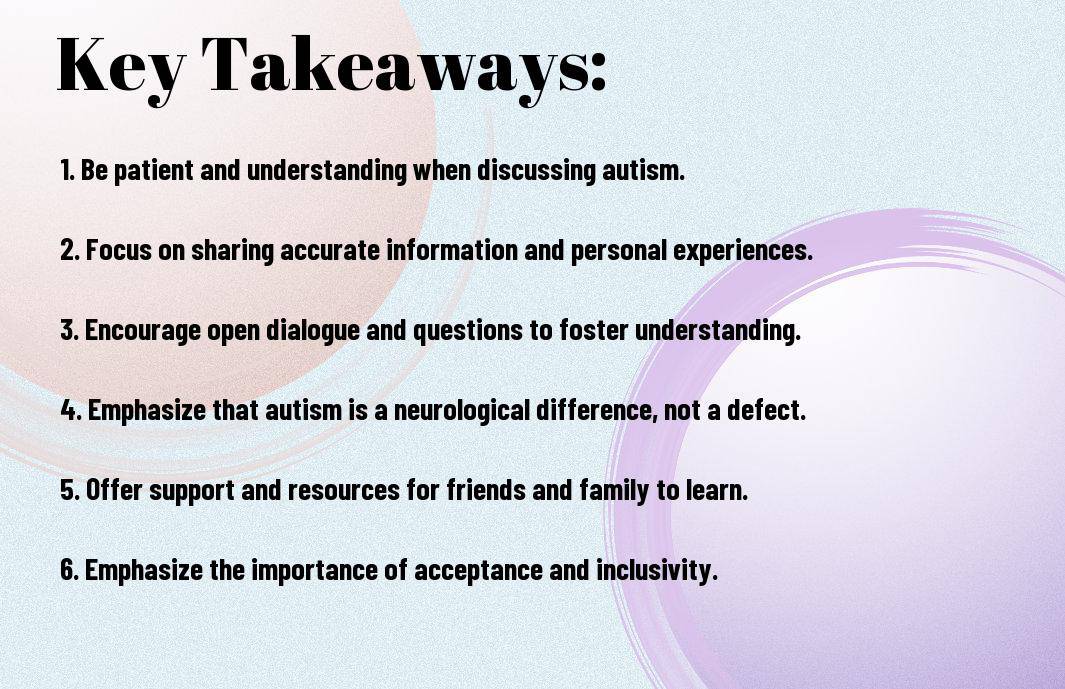Obfuscating a complex neurological condition like autism to friends and family can be a daunting task. However, it is crucial to educate loved ones about the intricacies of autism in order to promote understanding and support. It is important to approach the topic with patience, empathy, and accurate information, as misconceptions about autism can lead to prejudice and discrimination. In this blog post, we will delve into how to effectively explain autism to your friends and family, providing you with the knowledge and tools necessary to foster meaningful and supportive relationships. For an in-depth guide on this topic, visit How to explain autism to your family and friends.
Key Takeaways:
- Understanding autism: It is important to educate friends and family about what autism is, including the differences in communication, social interaction, and behaviour.
- Open communication: Encourage open and honest conversations about the challenges faced by individuals with autism, as well as the support they need from their friends and family.
- Support and acceptance: Emphasise the importance of providing support and acceptance to individuals with autism, while also acknowledging their unique strengths and abilities.


Autism Spectrum Disorder: Basics and Beyond
Defining Autism Spectrum Disorder (ASD)
Autism Spectrum Disorder (ASD) is a complex neurodevelopmental condition that affects individuals in varying ways. It is characterized by challenges in social interaction, communication, and restricted, repetitive patterns of behaviour. ASD encompasses a wide spectrum of symptoms and levels of impairment, hence the term “spectrum”. This means that no two individuals with ASD will experience the condition in exactly the same way.
Diagnosing ASD can be a complex and lengthy process, involving comprehensive assessments of a person’s behaviour and developmental history. It is essential to consult with healthcare professionals who have expertise in ASD diagnosis and management. Understanding the specific needs and strengths of individuals with ASD is crucial in providing appropriate support and interventions.
Common Characteristics of ASD
Individuals with ASD may exhibit a range of common characteristics, including difficulties in social communication and interaction, heightened sensory sensitivities, and a tendency towards repetitive behaviours or special interests. Some individuals with ASD may also experience challenges in understanding and expressing emotions, as well as difficulties in adapting to changes in routine or environment.
It’s important to note that individuals with ASD also possess many strengths, such as attention to detail, logical thinking, and a unique perspective on the world. Embracing these positive aspects and understanding the individual as a whole is essential in supporting their overall well-being and development.
Navigating Social Perceptions
When explaining autism to friends and family, it’s important to navigate the social perceptions that often surround this condition. Many people may hold misconceptions about autism, which can lead to misunderstandings and stigma. Addressing these perceptions can help create a more supportive and empathetic environment for individuals with autism.
Debunking Myths About Autism
One common myth about autism is that individuals with this condition lack empathy or emotions. This is not true – people with autism may simply express their emotions differently, but they are capable of deep empathy and connection. Another myth is that all individuals with autism have extraordinary skills or talents. While some may have certain strengths, this isn’t the case for everyone with autism. It’s important to debunk these myths and focus on understanding the individual rather than relying on stereotypes.
Positive Aspects of Autism
Despite the challenges that come with autism, there are also positive aspects to consider. Individuals with autism often have a unique way of thinking and approaching the world, which can lead to innovative problem-solving and creative thinking. They may also have a deep passion for their interests and hobbies, which can be a source of great joy and fulfilment. It’s crucial to recognise and celebrate these positive aspects, highlighting the strengths and capabilities of individuals with autism.
Understanding the positive aspects of autism can help shift the focus away from deficits and towards embracing and supporting the unique qualities of individuals with autism. By highlighting these strengths, we can create a more inclusive and accepting community for everyone.
Communication Strategies for Explaining Autism
Tailoring the Explanation to Your Audience
When explaining autism to friends and family, it’s important to tailor your explanation to suit the specific audience you are addressing. For instance, when speaking to close friends, you might be more informal and personal in your approach, using anecdotes and real-life examples to help them understand. On the other hand, when addressing extended family members or colleagues, you may need to provide a more general and educational explanation, using facts and statistics to support your points.
Understanding the communication style and preferences of your audience can also help you tailor your explanation effectively. Some people may respond better to visual aids, while others may prefer a more conversational approach. By considering these factors, you can ensure that your message is received and understood in the best possible way.
Tips for Discussing Sensitive Topics
When discussing sensitive topics related to autism, it’s important to approach the conversation with sensitivity and empathy. One tip is to use person-first language, emphasising the individual over their diagnosis. This can help to foster a more respectful and inclusive dialogue. Additionally, it’s important to create a safe and non-judgmental space for discussion, where everyone feels comfortable expressing their thoughts and asking questions.
- Use person-first language
- Create a safe and non-judgmental space for discussion
- Encourage open and honest communication
The goal of discussing sensitive topics is to promote understanding and acceptance among your friends and family. By approaching these conversations with care and respect, you can help to foster a supportive and empathetic environment for everyone involved.
Supporting Your Loved One with Autism
When it comes to supporting a loved one with autism, it’s essential to educate yourself and others about their unique needs and challenges. It’s common for friends and family members to have questions about autism, and it’s important to provide them with the resources and information they need to offer the best support possible. For more detailed information on explaining autism to friends and family, you can refer to this helpful guide on how to explain autism to friends and family.
The Role of Friends and Family
Friends and family members play a crucial role in the support network for individuals with autism. By understanding and accepting their unique needs, friends and family can provide a safe and nurturing environment that promotes the wellbeing of their loved one. It’s important for friends and family to educate themselves about autism and to be patient, compassionate, and accepting. Building a supportive and understanding network is key to the overall wellbeing of individuals with autism.
How to Offer Help and Understanding
Offering help and understanding to a loved one with autism can make a significant difference in their life. It’s important to be attentive and observant, and to learn their specific triggers and stressors. Providing a safe and predictable environment, offering clear communication, and being flexible are all crucial in offering support and understanding. It’s important to remember that every individual with autism is unique, so it’s essential to listen and learn about their specific needs and preferences. By offering understanding and support, friends and family can positively impact the lives of individuals with autism.
Understanding the needs of individuals with autism and offering appropriate support is essential for their overall wellbeing. By being informed and empathetic, friends and family members can create a nurturing environment that promotes the positive development and happiness of their loved one with autism.

Conclusion: Explaining Autism to Friends and Family
In conclusion, it is important to approach the topic of explaining autism to friends and family with patience, open-mindedness, and empathy. It is crucial to educate those around us about the complexities of autism in order to build a supportive and understanding network for individuals with autism. By sharing knowledge, experiences, and resources, we can help bridge the gap between misunderstanding and acceptance. It is also important to remember that each person with autism is unique, and our approach to educating others should be tailored to the specific needs and experiences of the individual. Together, we can create a more inclusive and supportive environment for those with autism and their loved ones.
FAQ
Q: What is Autism?
A: Autism is a neurodevelopmental disorder that affects communication, social interaction, and behaviour.
Q: How can I explain Autism to my friends and family?
A: Start by educating yourself about Autism so that you can provide accurate information to others. Be patient and open-minded, and encourage questions and discussions.
Q: What are some common misconceptions about Autism?
A: Some common misconceptions include believing that all individuals with Autism have exceptional skills, or that Autism is caused by bad parenting. It’s important to dispel these myths and provide accurate information.
Q: How can I support a loved one with Autism?
A: Offer your understanding and acceptance, be willing to adapt and accommodate their needs, and be an advocate for their rights and inclusion in society.
Q: What resources are available for both individuals with Autism and their families?
A: There are numerous support groups, educational materials, and therapy options available. It’s important to seek out reputable and evidence-based resources.
Q: Is there a cure for Autism?
A: Autism is not a disease that can be cured. Instead, the focus should be on providing support, understanding, and opportunities for individuals with Autism to thrive.
Q: How can I promote Autism awareness and acceptance in my community?
A: Participate in Autism awareness events, educate others about Autism, and advocate for policies and practices that promote inclusion and support for individuals with Autism.







